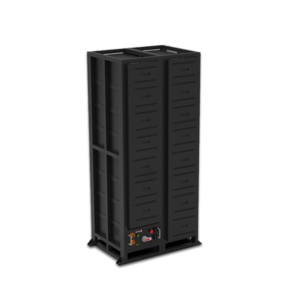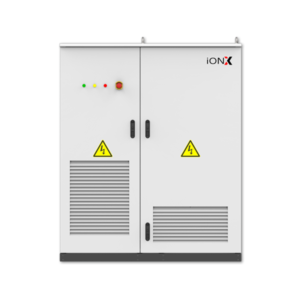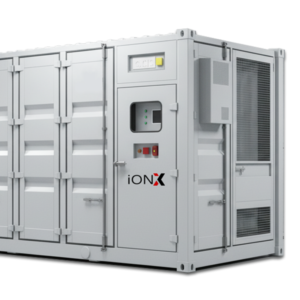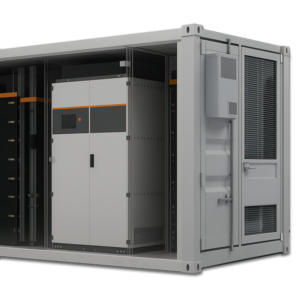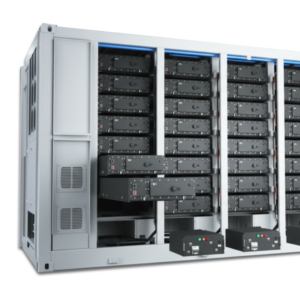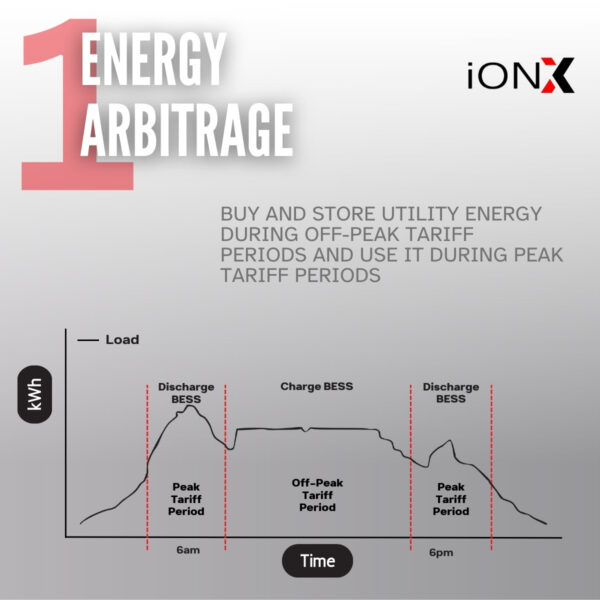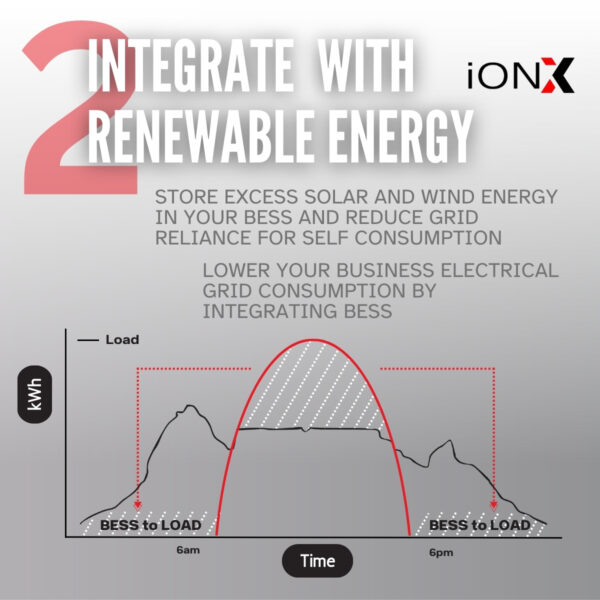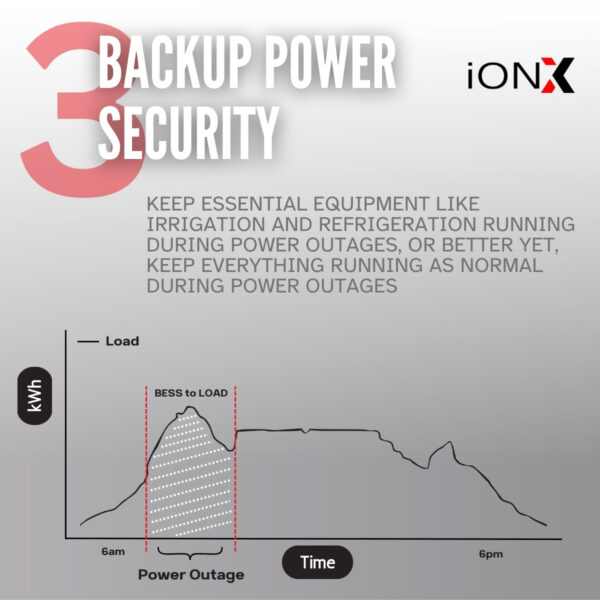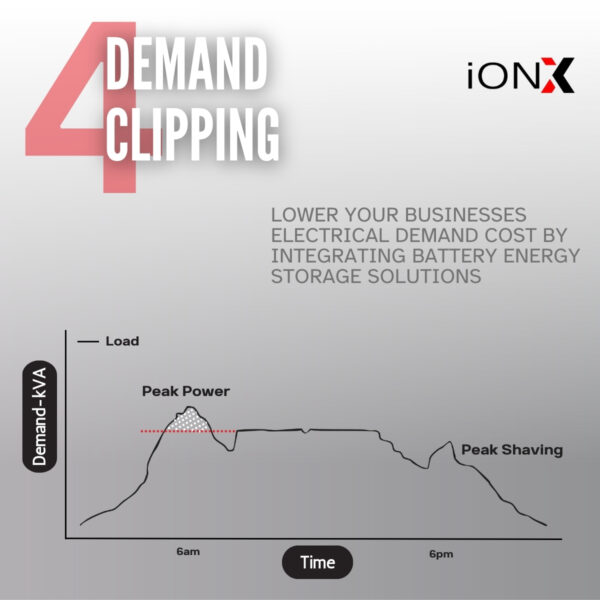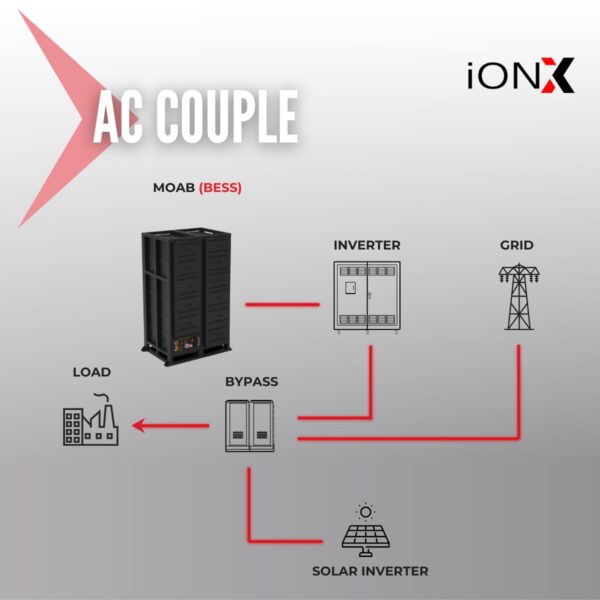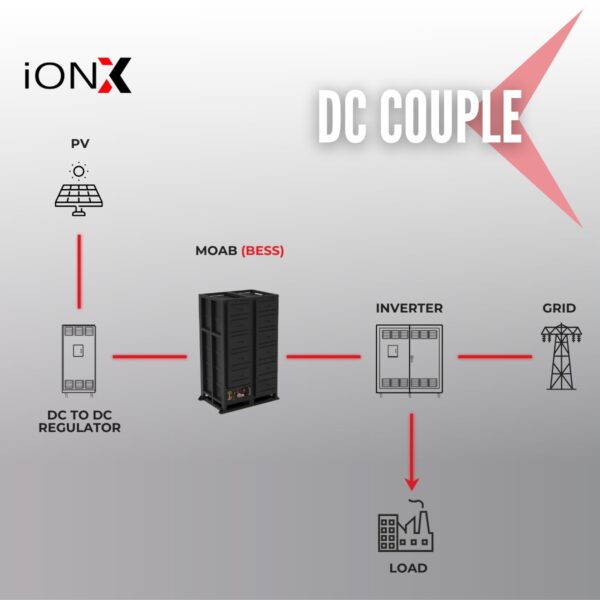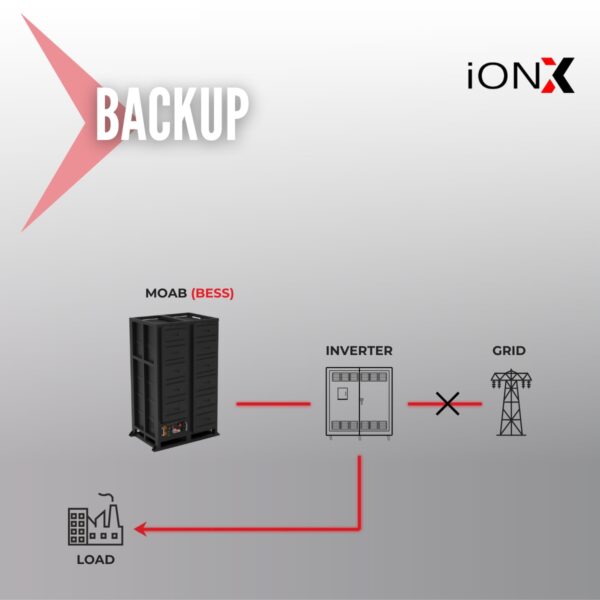Product Range
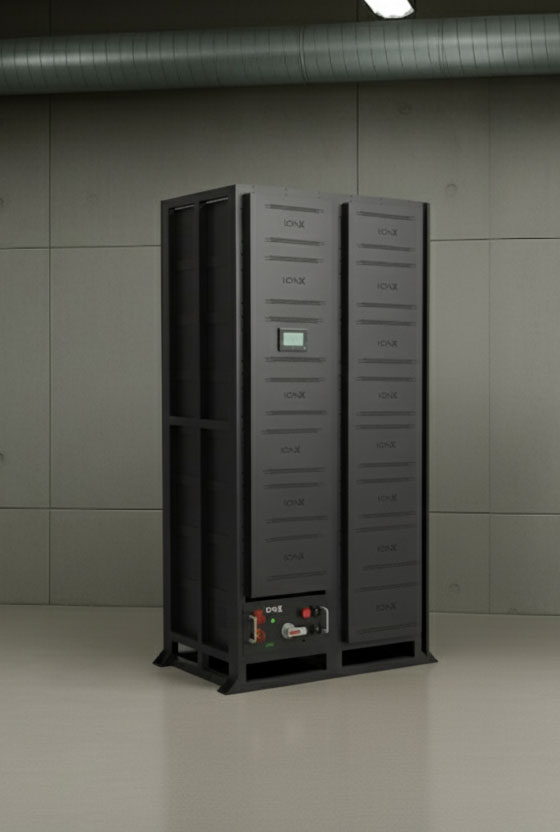
CORE
The iON-X CORE SERIES is engineered for modularity and high performance, making it a flexible foundation for commercial, industrial, and agricultural energy storage. Built with Tier 1, A-Grade LFP (Lithium Iron Phosphate) cells from EVE, this series guarantees safety and a long operational life.
A key feature is its Advanced 3-Level Battery Management System (BMS), which ensures precise cell-level monitoring and control, integrating seamlessly with the cluster and plant controllers for optimal performance. The system's thermal stability is maintained by an active cooling mechanism, ensuring reliability even under demanding conditions. The modular "rack and stack" design allows for effortless installation and scalability, from a single 129kWh cluster up to a massive 3.8MWh system by paralleling up to 16 clusters. For safety, it includes a prominent E-STOP for immediate cluster-level isolation. Monitoring is made simple with a local display and cloud-based connectivity for remote access and management.
Range & Specifications
| Core 129 | Core 145 | Core 161 | Core 177 | Core 193 | Core 209 | Core 225 | Core 241 | |
|---|---|---|---|---|---|---|---|---|
| Modules in Series | 8 | 9 | 10 | 11 | 12 | 13 | 14 | 15 |
| Nom. kWh / Cluster | 129 | 145 | 161 | 177 | 193 | 209 | 225 | 241 |
| Nom. Voltage | 409,6 | 460,8 | 512 | 563,2 | 614,4 | 665,6 | 716,8 | 768 |
Module Info
|
Cell |
EVE Tier 1 - A Grade | |||||||
|
Module Capacity |
16,08 kWh | |||||||
|
Cont Charge/Discharge A |
157 ADc | |||||||
|
Max Charge/Discharge A |
157 ADc | |||||||
|
Max modules in Series |
15 No. | |||||||
|
Max Clusters in Parallel |
16 No. | |||||||
|
Max Cluster Capacity |
241 kWh | |||||||
|
Max Capacity at 16 Clusters |
3858 kWh | |||||||
|
Cycle life |
10 000 Cycles, 80% DoD @ 25DegC operation | |||||||
|
Charge Discharge Efficiency |
>96% | |||||||
|
Battery IP rating |
IP20 | |||||||
|
Compliance |
UN38,3, UL9540A | |||||||
|
Cluster Dimension (W x H x D) |
1180mm X 2278mm X 777mm | |||||||
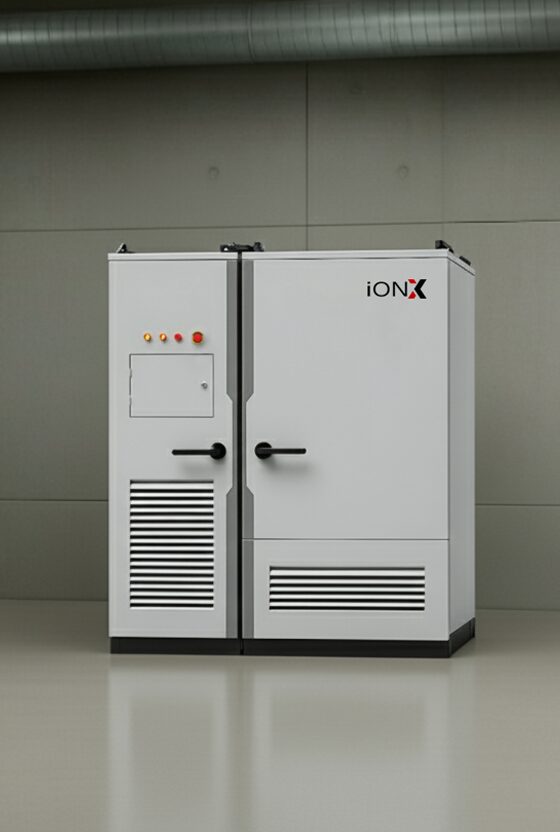
CUBE
The iON-X CUBE SERIES is a fully integrated, all-in-one energy storage solution designed for rapid deployment and robust outdoor performance. Housed in a rugged IP54-rated enclosure, the Cube combines the battery system with a pre-certified, NRS097-approved Power Conversion System (PCS), making it a true "drop-down" unit that simplifies installation and commissioning.
It boasts an exceptional 10ms changeover time, ensuring a seamless switch to battery power during grid outages. Safety is paramount, with a 3-Tier Fire Safety system that is NFPA 855 compliant, featuring smoke and hydrogen sensors, an interface for water suppression, explosion relief vents, and an emergency E-STOP. The system's modular architecture allows for paralleling up to four units, enabling scalable solutions from 261kWh to over 1MWh. This adaptability makes it perfect for businesses seeking a reliable and pre-engineered solution.
Range & Specifications
| CUBE 261 | CUBE 522 | CUBE 783 | CUBE 1044 | CUBE 1305 | CUBE 1566 | CUBE 1827 | CUBE 2088 | |
|---|---|---|---|---|---|---|---|---|
| No. Units | 1 | 2 | 3 | 4 | 5 | 6 | 7 | 8 |
| Inverter/kw | 125 | 250 | 375 | 500 | 625 | 750 | 875 | 1000 |
| Battery/kWh | 261 | 522 | 783 | 1044 | 1305 | 1566 | 1827 | 2088 |
Specifications
| AC Parameters | |
|---|---|
| Rated AC power | 125kW |
| Maximum AC power | 137.5kW |
| Rated AC current | 182A |
| Maximum AC current | 217A |
| STS rated power | 250kW |
| Rated grid voltage | 400V |
| Available grid voltage | 300-460V |
| Rated grid frequency | 50Hz/60Hz |
| THDi | <3(Rated output power) |
| Power factor | >0.99 |
| Power factor range | -1~1 |
| AC overload capability | 1.1Pn, 10min |
| DC / Battery Parameters | |
|---|---|
| Item | Parameter |
| Pack Config | 1P52S |
| Rated capacity | 314 Ah |
| Rated Electricity | 52.25 KWH |
| Cluster Capacity | 261KWH |
| Cycle Life | 10000 cycles, 80% DoD |
| Operating temperature range | Charge:0-55℃ Discharge:-20~55℃ |
| Balancing Method | Active/passive Balancing |
| Cooling Method | Liquid cooling |
| MPPT voltage range | 150 ~ 1000VDc |
| MPPT input current | 45A * 8 |
| MPPT module size | 2 X 60kW |
| System parameters | |
|---|---|
| Ambient temperature | -40~60℃ |
| Cabinet Ingress protection | IP54 |
| Cabinet Cooling method | Smart air cooling |
| Maximum operating altitude | 3000m(Derating in case of greater than 3000m) |
| Standby power consumption | <12W |
| Communication interface | Ethernet, RS485, CAN |
POD
The iON-X POD SERIES offers a pre-fabricated, containerized DC energy storage solution, optimized for large-scale commercial and industrial applications. Delivered in a standard 20ft container, this air-cooled system is designed for efficiency and rapid deployment, minimizing on-site civil works.
Each container is a fully equipped unit, featuring robust Rockwool insulation, two powerful 20kW air-conditioning units for thermal management, LED lighting, and a camera system for security. The integrated control cabinet houses a UPS for backup power, the 3-Tier management system, and DC combiners. Fire safety is handled by an advanced Evofluoropropane Fire Suppression system. The Pod series provides a streamlined way to deploy significant DC storage capacity, ranging from 1.4MWh up to 11.5MWh.

Range & Specifications
| POD 6 | POD 8 | POD 10 | POD 12 | |
|---|---|---|---|---|
| Module capacity (kWh) | 20,09 | 20,09 | 20,09 | 20,09 |
| No. modules | 12 | 12 | 12 | 12 |
| No. clusters | 6 | 8 | 10 | 12 |
| Total capacity | 1446,48 | 1928,64 | 2410,8 | 2892,96 |
| Rated kWh (80% dod) | 1157 | 1543 | 1929 | 2314 |
| Nominal voltage | 768 | |||
| Max voltage | 864 | |||
| Min voltage | 648 | |||
| Std. Charge and discharge | 0.5C / 0.5C | |||
| Max constant discharge | 0,7C | |||
| Max peak discharge | 1C <10min | |||
| Working temperature | Discharge temperature: 0~60℃ | |||
| Charging temperature: -20~60℃ | ||||
| Storage temperature: -20~60°C | ||||
| Max DOD ave | 80% | |||
| Warranty/ cycles/ EOL | 10,000 cycles / 12 year - 65% EOL | |||
| Compatibility | Atess, Megarevo, Yunt, Solis, | |||
| EMS communication | As per request, no restriction | |||
| Certifications | RoHS, CE, UN38.3, IEC62619 | |||
| Battery certifications | UL9540A, UL1973 | |||
| Fire certificate | CE, GB | |||
POD+
The iON-X POD+ SERIES elevates the containerized concept by providing a fully integrated DC and AC solution. This series combines the high-density storage of the Pod with an included Power Conversion System (PCS), delivering a turnkey, grid-ready asset in a single container. This factory-integrated approach significantly reduces project complexity and on-site commissioning time.
The Pod+ is built for reliability and site-specific customization, allowing for flexible layouts and configurations to meet unique project demands. By providing a single-sourced, pre-commissioned unit, it lowers costs, simplifies procurement, and accelerates project timelines. It inherits the robust safety and control features of the Pod series, including advanced fire suppression, climate control, and insulation, while offering the longevity of 10,000 cycles backed by a 12-year warranty.

Range & Specifications
| POD 6 | POD 8 | POD 10 | POD 12 | |
|---|---|---|---|---|
| Module capacity (kWh) | 20,09 | 20,09 | 20,09 | 20,09 |
| No. modules | 12 | 12 | 12 | 12 |
| No. clusters | 6 | 8 | 10 | 12 |
| Total capacity | 1446,48 | 1928,64 | 2410,8 | 2892,96 |
| Rated kWh (80% dod) | 1157 | 1543 | 1929 | 2314 |
| Nominal voltage | 768 | |||
| Max voltage | 864 | |||
| Min voltage | 648 | |||
| Std. Charge and discharge | 0.5C / 0.5C | |||
| Max constant discharge | 0,7C | |||
| Max peak discharge | 1C <10min | |||
| Working temperature | Discharge temperature: 0~60℃ | |||
| Charging temperature: -20~60℃ | ||||
| Storage temperature: -20~60°C | ||||
| Max DOD ave | 80% | |||
| Warranty/ cycles/ EOL | 10,000 cycles / 12 year - 65% EOL | |||
| Compatibility | Atess, Megarevo, Yunt, Solis, | |||
| EMS communication | As per request, no restriction | |||
| Certifications | RoHS, CE, UN38.3, IEC62619 | |||
| Battery certifications | UL9540A, UL1973 | |||
| Fire certificate | CE, GB | |||
GRIDX
The iON-X GRIDX SERIES is the pinnacle of the iON-X lineup, engineered specifically for utility-scale impact. This liquid-cooled, containerized solution delivers maximum energy density and performance, designed to meet the rigorous demands of grid-level applications. The advanced liquid-cooling system provides superior thermal management, enabling higher C-rates and ensuring a longer system lifespan under continuous, heavy cycling.
Each GridX container can house over 5MWh of storage and 2MW of power, built with high-performance EVE Energy LFP cells. It is designed for seamless grid integration with support for multiple communication protocols, including Modbus TCP, IEC104, and IEC61850. The multi-layered fire protection system includes aerosol suppression, combustible gas detection, and an optional water fire-fighting system. The GridX series is fully customizable, offering scalable solutions from 5MWh to over 450MWh to tackle the largest energy challenges.

Range & Specifications
| GRIDX 5 | GRIDX 10 | GRIDX 15 | GRIDX 20 | GRIDX 25 | GRIDX 30 | |
|---|---|---|---|---|---|---|
| No. Containers | 1 | 2 | 3 | 4 | 5 | 6 |
| PCS (recommended) Mw | 2 | 5 | 7.5 | 10 | 12.5 | 15 |
| BATTERY MWh | 5.01 | 10.02 | 15.03 | 20.04 | 25.05 | 30.06 |
* Inverter sizes customizable to size requirements
Specifications
| AC Parameters | ||||
|---|---|---|---|---|
| Nominal AC power | 1075kVA | 1290kVA | 1505kVA | 1725kVA |
| AC connection | Three-phase three-wire (3P3W) | |||
| Overload Capability | 1183kVA | 1419kVA | 1656kVA | 1898kVA |
| AC voltage | 690(-15%~10%)V | |||
| AC frequency | 50/60(-5~5)Hz | |||
| THDi | ≤3% | |||
| AC PF | -0.9~0.9 | |||
| System Parameters | ||||
|---|---|---|---|---|
| Size (W*H*D) | 2200*2160*1300mm | |||
| Weight | 1921kg | 2014kg | 2107kg | 2200kg |
| Noise | <75dB | |||
| Protection | IP54 | |||
| Operating temp. | -20°C to 60°C (De-rating over 45°C) | |||
| Cooling | Air cooling | |||
| Humidity (storage) | 0~95%(No condensing) | |||
| Max altitude | 3000m (De-rating over 3000 m) | |||
| Battery | |
|---|---|
| Total | 5.01MWh |
| Cell type | 3.2V/314ah |
| System Configuaration | 1P416S*12 |
| Battery Voltage range | 1164,8~1497,6V |
| Container size | 6058*2550*3150mm |
| Weight | ~45t |
| Corrosion resistance | C5 |
| Degree of protection | IP55 |
| Operation temperature | -30°C~50°C |
| Humidity range | 0~95% |
| Battery System | Liquid Cooling |
| Fire suppression system | Pack-level fire protection + compartment-level + water spray |
| Maximum altitude | 4000m |
Compatible with leading inverter brands.





Monitoring
Precision 3-Tier Battery Monitoring System
The protection and monitoring functions of the battery system are realized through a BMS with a three-level management architecture:
01 BMU (Battery Management Unit),
02 BCMU (Battery Cluster Management Unit), and
03 SCU (System Control Unit).
The main functions of the BMS at each level are as follows:
BMU (slave control, built into the battery pack): Monitor the voltage and temperature of individual cells, transmit these real-time data to the upper-level BCMU via CAN protocol and control the voltage equalization of individual cells.
BCMU (master control, built in the HV control box): Monitor the total voltage and total current of the entire battery cluster, transmit these real-time data to the upper level SCU via CAN protocol, calculate the SOE, SOH and insulation resistance of the battery cluster, control the relay switch to protect battery cluster based on real-time battery status, alarm and protection information.
SCU (central control, integrated in the electrical room): Collect the information from the lower-level BCMU, calculate and evaluate the SOE, maximum charge/discharge power, and SOH of the battery stack with multiple parallel-connected battery clusters, enable interlinked control with the automatic fire suppression system, A/C system and UPS via RS485, communicate with the PCS via CAN and with the EMS via Ethernet, receive dispatching commands from the higher-level management system to coordinate operation with the PCS.
Sustainability comes first //
Certifications

Certified to have met internationally recognized Quality Management Systems

Certified to have met compliance with the essential requirements

Certified to have met Battery Design and production

Certified to have met safety requirements for Alt, Thermal, Vib; Shock; Ext SC; Overvoltage; Forced Discharge

Certified to have met safety requirements for OH&S and Environmental Management

Certified to have met the international standards for thermal runaway management.

Certified to restrict the use of hazardous substances.
USE CASES
Energy Arbitrage
Energy arbitrage refers to the practice of buying energy when prices are low and selling it when prices are high, capitalizing on the fluctuations in energy prices throughout the day or across seasons. This strategy is often employed in electricity markets and is made possible by advancements in energy storage technologies and deregulated energy markets.
- Price Volatility: Electricity prices fluctuate due to demand-supply dynamics, renewable energy variability, and market regulations. Arbitrage exploits these price differences for the users benefit.
- Battery Energy Storage Systems (ESS): Battery Technologies are central to arbitrage. Our systems store electricity when prices are low and dispatch it during peak demand when prices are high.
- Market Participation: We welcome working with independent power producers, and large energy consumer to participate in wholesale energy markets or local energy exchanges to perform arbitrage in the C&I, Agricultural and Manufacturing sectors, due to the simplicity in effecting implementation
Benefits
- Cost Savings: Reduces energy costs for businesses and utilities.
- Grid Stabilization: Will assist in Balancing supply and demand, improving grid reliability.
- Integration of Renewables: Addresses the intermittency of solar and wind energy, enabling better utilization of renewable resources.
Energy arbitrage is gaining momentum with the rise of renewable energy and the need for efficient energy management, making it a pivotal concept in the transition to sustainable energy systems.
USE CASES
Power Security for Energy Backup Systems: A Brief Overview
Energy self-consumption refers to the proportion of energy generated by a local renewable energy system that is integrated to battery energy storage, , that is directly used by the same facility where it is produced. This decentralized energy systems, promotes sustainability and reducing dependence on external energy supplies.
Key Benefits of Energy Self-Consumption:
1. Cost Savings: By using self-generated energy, consumers can reduce electricity bills, as less power is drawn from the grid.
2. Energy Independence: It reduces reliance on external energy providers, enhancing resilience against price volatility or supply disruptions.
3. Environmental Impact: Local energy use minimizes transmission losses and supports renewable energy adoption, helping to lower greenhouse gas emissions.
4. Grid Benefits: High self-consumption reduces the strain on energy grids, particularly during peak usage times.
Factors Influencing Self-Consumption:
- System Size: Over-dimensioned systems may lead to surplus energy, reducing self-consumption rates
- Energy Storage: Batteries can increase self-consumption by storing this excess energy for later use.
- Consumption Patterns: Aligning energy usage with peak production periods (e.g., daytime for solar) improves self-consumption rates.
- Smart Technology: Our Advanced system controls will always allow the most efficient use of energy when coupled to reputable 3rd party energy management systems.
Promoting energy self-consumption is critical for achieving global renewable energy goals. The IonX team will always ensure to collaborate with our skilled installers to guide users on methods to overcome barriers and maximize the potential of decentralized energy solutions.
USE CASES
Power Security for Energy Backup Systems: A Brief Overview
Power security in the context of energy backup systems focuses on ensuring the reliability and resilience of auxiliary power sources to maintain operations during outages or disruptions. iONX systems are critical for homes, businesses, healthcare facilities, and critical infrastructure where uninterrupted power is essential.
Key Aspects of Power Security in Energy Backup Systems:
1. Reliability and Availability
- Ensuring that backup systems, such as generators, batteries, or uninterruptible power supplies (UPS), activate immediately when the primary power source fails.
2. Scalability and Capacity
- Designing systems with sufficient capacity to meet the energy demands of critical functions during outages.
- Using iONX modular backup solutions allows for scalability as needs grow.
3. Redundancy
- Implementing multiple layers of backup (e.g., dual generators or combined UPS and iONX battery systems) to mitigate single points of failure.
- Diversifying energy sources, such as incorporating renewable options like solar with battery storage.
4. Integration with Primary Systems
- Seamlessly integrating backup systems with the primary grid to prevent disruptions during switching.
- Using automatic transfer switches (ATS) for quick and efficient power transitions.
Importance of Backup System Security:
Backup systems are lifelines during power outages, especially for critical applications such as hospitals, data centers, and emergency services. Ensuring their security and functionality is vital to prevent operational downtime, data loss, and risks to human safety.
Investments in advanced technologies, regular maintenance, and robust cybersecurity measures are essential to enhancing the security of energy backup systems. As power systems increasingly integrate renewable and decentralized energy resources, backup solutions must evolve to ensure they remain reliable, sustainable, and secure.
USE CASES
Energy demand clipping refers to the process of reducing peak energy demand to improve the stability, efficiency, and cost-effectiveness of energy systems. This is particularly relevant in electricity grids, where high demand peaks can strain infrastructure and increase operational costs
Key Features:
1. Purpose:
- To reduce or "clip" the spikes in energy demand.
- Minimize the need for expensive and carbon-intensive peak-generation resources.
2. Methods:
- Demand-side management (DSM): if possible we would always encouraging consumers to shift or reduce energy use during peak times through pricing incentives (e.g., time-of-use tariffs) or behavioural programs.
- Energy storage: Utilising IonX batteriesto store energy during low-demand periods and discharge it during peak periods in turn lowering the kVA demand
- Distributed generation: Combining renewable energy sources with battery energy storage to supply power during high-demand periods.
- Smart grid technologies: Our Advanced system controls will always allow the most efficient use of energy when coupled to reputable 3rd party Automated systems to monitor and manage energy distribution effectively.
3. Benefits:
- Lower energy costs for consumers and utilities.
- Reduced strain on infrastructure, extending its lifespan.
- Enhanced reliability and resilience of the energy system.
- Decreased greenhouse gas emissions by avoiding reliance on peaking plants.
By addressing peak demand through clipping, energy systems can operate more sustainably and cost-effectively.
USE CASES
Grid firming refers to the set of strategies and technologies used to ensure the stability, reliability, and resilience of an electrical grid, particularly as it integrates variable renewable energy sources like solar and wind. These sources are inherently intermittent, as their output depends on weather conditions and time of day. Grid firming compensates for these fluctuations to maintain a consistent energy supply and match demand.
Key Approaches to Grid Firming:
- Energy Storage Systems: Utilising iONX Batteries to store excess energy during peak production and release it during low production periods.
- Demand Response: Adjusting or shifting energy consumption in response to supply conditions to stabilize the grid.
- Dispatchable Energy Sources: Supplementing renewables with fast-responding, on-demand power sources such as Battery Energy Storage.
- Grid Infrastructure Enhancements: Upgrading transmission lines, smart grids, and interconnectors to improve energy distribution and accommodate renewable variability.
- Hybrid Systems: Combining renewable energy systems with firming technologies, such as solar farms paired with IONX battery storage.
- Grid Balancing Services: Using advanced algorithms, software, and automation to monitor and adjust energy flows in real-time.
Effective grid firming is crucial as the world transitions to a cleaner energy system, ensuring that renewable energy sources can reliably meet energy needs without compromising grid stability.

AC-Coupled Systems
AC-coupled systems are designed to integrate seamlessly with existing solar setups. In this configuration, an AC solar inverter is connected to the backup side of the system, allowing it to remain operational during outages.
This approach is ideal for clients who already have solar installations on-site and want to add an iONX battery inverter for enhanced energy management. AC-coupled solar systems can also charge batteries to reduce reliance on the grid, making them an excellent choice for lowering energy costs.
At iONX, our AC-coupled solutions are built for flexibility and efficiency, empowering you to get the most out of your solar and battery investments.
DC-Coupled Systems
DC-coupled systems utilize a charge controller connected directly to the iONX batteries, bypassing the need for a conventional AC inverter. This configuration allows the solar system to operate without requiring an AC reference, enabling it to start production earlier in the day and continue later into the evening.
One key advantage of DC-coupled systems is their ability to recharge batteries even when the inverter shuts down due to low battery levels. Unlike traditional systems that rely on the grid to recharge batteries, the solar system in a DC-coupled setup can recharge them directly, restoring power to the inverter independently.
Backup Power Solutions
Backup power systems are essential for ensuring uninterrupted electricity during outages, keeping your lights on and essential devices running. These systems are the most popular choice due to their cost-effectiveness and reliability, delivering power precisely when you need it most.
At iONX, we specialize in providing innovative backup power solutions tailored to your needs. Our systems combine cutting-edge technology with proven performance, ensuring you have power when it matters most.
Downloads
Here you will have relevant documentation for our products.

